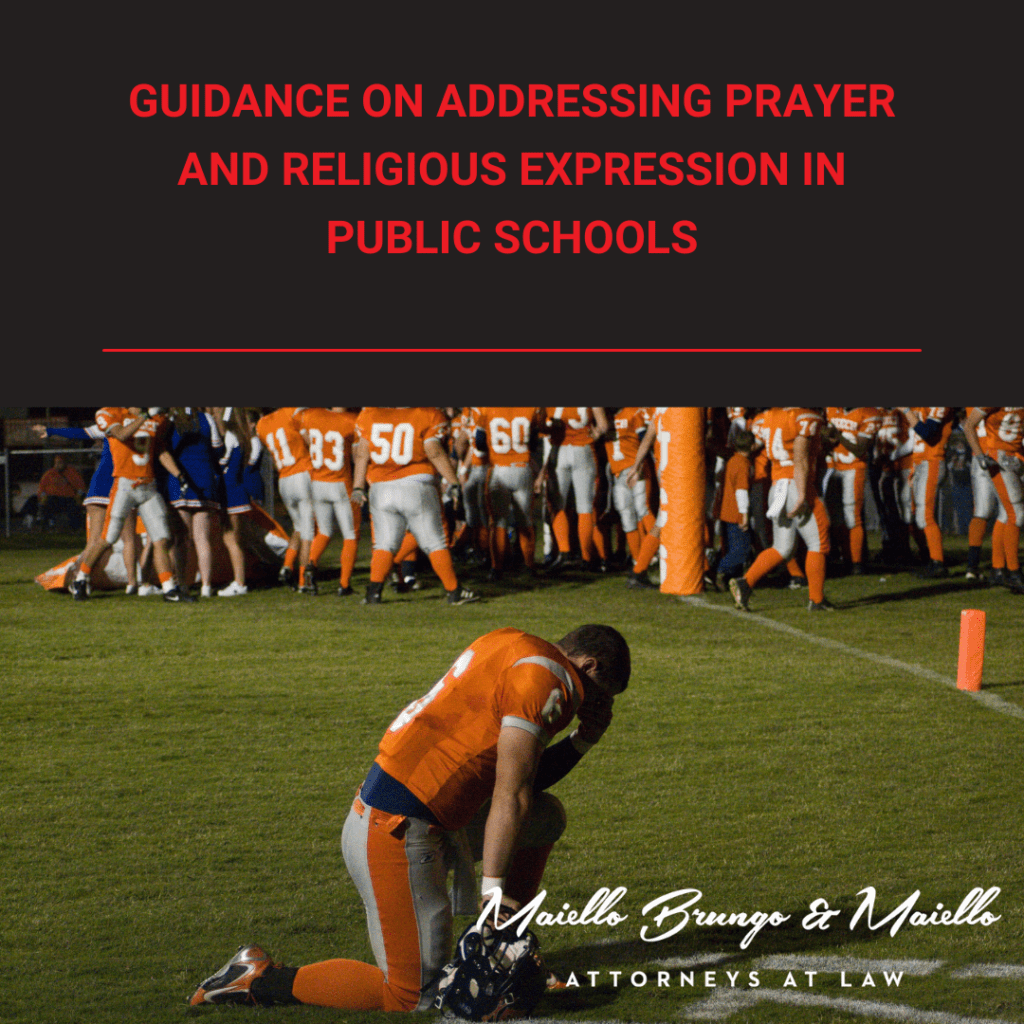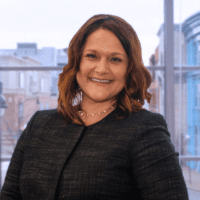This is an update to previous Legal Insight: Does the Kennedy v Bremerton School District Ruling Introduce Prayer Back Into School? (August 2022)
On May 15, 2023, U.S. Secretary of Education, Miguel A. Cardona, Ed.D., issued a letter to all Chief State School Officers and District and School Leaders in the U.S. to provide updated guidance regarding constitutionally protected prayer and religious expression in public elementary and secondary schools. Secretary Cardona clearly states in his letter that “guaranteeing religious freedom in and outside of public schools has been and continues to be vital to the strength of our country and our democracy” making it very clear that the First Amendment to our Constitution protects free speech and religious liberty, which includes prohibiting any governmental establishment of religion and protecting the free exercise of faith.
Contact the Education Lawyers of MBM Law
Kennedy v. Bremerton School District Review
Secretary Cardona also expressed the government’s perception the Supreme Court’s decision in Kennedy v. Bremerton School District, 142 S. Ct. 2407 (2022) which has resulted in increased discussion nationwide about prayer and religious expression in public schools. That decision involved a public high school football coach who was suspended by the School District for having offered a brief personal prayer on the field after games on three occasions. The Supreme Court held that such prayer was private speech and that the school had not offered a sufficient justification for restricting it.
Due to the Supreme Court’s decision and subsequent related developments, the Department of Education expressed the importance that school districts and the public have an accurate understanding of the current state of the law and the scope of public schools’ authority to regulate the way in which teachers, coaches, and other school employees may engage in religious expression in the presence of the students under their care.
If you have additional questions about how this decision affects your school district, contact the experienced education attorneys of MBM Law.
The First Amendment, Prayer in School, and Public School
As a result of the Supreme Court ‘prayer in school’ ruling, on May 15, 2023, the Department provided revised guidance on prayer in public school and other religious expression. The guidance addresses how constitutional principles apply in various educational contexts such as prayer during non-instructional time, accommodation of prayer during instructional time, prayer at graduation, moments of silence, the gathering of religious student groups for prayer, and the rights and responsibilities of teachers and other school employees. The following is a brief summary of the issues addressed in the guidance.
A. The Section 8524(b) Certification Process
To receive funds under the Elementary and Secondary Education Act (ESEA), a Local Educational Agency (LEA) must annually certify in writing to its State Educational Agency (SEA) that no policy of the LEA prevents, or otherwise denies participation in, constitutionally protected prayer in public elementary and secondary schools, as detailed in Part II of this updated guidance. An LEA must provide this certification to the SEA by October 1 of each year during which the LEA participates in an ESEA program.
B. Enforcement of Section 8524(b)
Section 8524(c) of the ESEA, requires the Secretary to secure compliance with rules or orders with respect to an LEA that fails to certify, or is found to have certified in bad faith, that no policy of the LEA prevents, or otherwise denies participation in, constitutionally protected prayer in public elementary and secondary schools. The General Education Provisions Act also authorizes the Secretary to take actions against recipients of Federal education funds that are not in compliance with the ESEA which may include, among other things, entering into a compliance agreement with the recipient to bring it into compliance, issuing a cease and desist order, and withholding funds until the recipient comes into compliance.
C. Overview of Governing Constitutional Principles
The First Amendment to the U.S. Constitution both prevents the government from establishing religion and protects religious exercise and religious expression from unwarranted government interference and discrimination. A public school and its officials may not prescribe prayers to be recited by students or by school authorities. However, nothing in the First Amendment converts the public schools into religion-free zones, or requires students, teachers, or other school officials to leave their private religious expression behind at the schoolhouse door. The line between government-sponsored and privately initiated religious expression is vital to a proper understanding of what the Religion and Free Speech Clauses of the First Amendment prohibit and protect. Although a government may not promote or favor religion or coerce the consciences of students, schools also may not discriminate against private religious expression by students, teachers, or other employees. Schools must also maintain neutrality among faiths rather than preferring one or more religions over others.
MBM Law has a team of education attorneys that can consult you on your public school district’s concerns. Call us today to discuss the school law questions you may have.
Religious Expression in Public Schools News
The Guidance also addresses a number of circumstances which may arise in Public Schools when governing Constitutional principles related to prayer and religious expression. With regard to prayer the following scenarios are analyzed and USDE provides guidance on how to address such circumstances.
- Prayer and Religious Exercise During Non-Instructional Time
- Organized Prayer Groups and Activities
- Teachers, Administrators, and Other School Employees
- Moments of Silence
- Accommodation of Prayer and Religious Exercise During Instructional Time
- Student Assemblies and Noncurricular Events
- Prayer at Graduation
- Baccalaureate Ceremonies
With regard to religious expression other than prayer, the Guidance articulates the best means of addressing the following circumstances.
- Religious Literature
- Teaching about Religion
- Student Dress Codes and Policies
- Religious Expression in Class Assignments and Homework
- Excusals for Religious Activities
MBM Law Consults Public Schools on Prayer in School
If you are an elementary, secondary, or high school in need of education law guidance, the top education attorneys at MBM Law may be able to assist you. Our experienced team is knowledgeable and up-to-date on the changes happening such as prayer in school and other religious expression updates. Please email or contact our team today to get started.


